Your cart is currently empty!
Author: admin
-
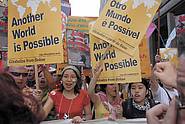
ACORN International expands organizing expertise abroad
 ACORN International was formed to share U.S. members’ grassroots organizing experiences with families and friends in their home countries and to improve the lives of people around the world.
ACORN International was formed to share U.S. members’ grassroots organizing experiences with families and friends in their home countries and to improve the lives of people around the world. Because low-income workers are often forced to migrate for work opportunities to support their families, many have connections in other countries. Corporations also cross borders in search of cheaper workforces and more lenient government policies. For this reason, U.S. ACORN members want to share their successful strategies, fighting exploitative corporations and abusive economic policies.
ACORN has expanded throughout the Americas and to India, defending citizens and workers suffering from globalization in the 21st century. Corporations often rely on the separation between nations to take advantage of workers despite the similarity of their issues. ACORN focuses on the challenges faced by all low-income families, regardless of nationality.
ACORN’s history began 38 years ago in Little Rock, Ark., in the wake of the U.S. civil rights and social movements of the 1970s. Now, ACORN takes the wealth of that experience to the world.
-

ACORN International Latin America Director Shares Experiences with U.S.
 NEW ORLEANS – Ercilia Sahores, Director of ACORN Latin America, said low-income people in Latin America face similar challenges as those in the United States.
NEW ORLEANS – Ercilia Sahores, Director of ACORN Latin America, said low-income people in Latin America face similar challenges as those in the United States. Sahores, who gave a presentation at ACORN’s national headquarters in New Orleans on June 6, said ACORN began organizing internationally because ACORN members in the United States had family members in Latin American countries who were interested in organizing there as well. When ACORN began to organize in the Dominican Republic, people joined in record numbers. Many of the doors organizers knocked on were opened by people who
had heard of ACORN from their family members in New York City and who invited the organizers inside with a warm welcome.
ACORN began its Latin American organizing in Lima, Peru, where low-income people were forced to pay 25 percent of their income in taxes on their homes, plus back taxes. ACORN Peru also organized for potable water, which was made more difficult by the dictatorship ruling the country and the lack of infrastructure.
Peru has produced compelling ACORN leaders, such as Ricardo, who was born blind, and Violeta, whom Ercilia described as one of the 10 reasons she works for ACORN. Violeta started out afraid to speak publicly or with politicians – she spoke Quechua, not Spanish. But through ACORN, she learned that she is just as important as anyone else, and now she can be seen at every protest as the one holding the bullhorn.
As in the U.S., ACORN chooses where to organize based on income and all the problems that go along with having little of it, such as lack of education and poor healthcare. ACORN Latin America is currently organized in Peru, Argentina, Mexico, and the Dominican Republic.
Core issues for ACORN Argentina, Ercilia’s home country, include improving infrastructure, housing and security. They are also working to implement comunas, which would allow low-income people to have a say in their local government. Children are active members of ACORN Argentina as well – they make the signs that people carry during protests.
ACORN Dominican Republic got off to a great start in October of 2007, where just two staff and one head organizer signed up 600 members in their first month. Unfortunately, the Dominican Republic was devastated by Hurricane Noel at the end of that month. ACORN responded to the disaster, shifting the organization’s focus to storm recovery and disaster preparedness.
-
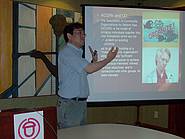
South Korean Organizer Speaks to ACORN about Organizing in Asia
 NEW ORLEANS – What is the meaning of community? With that question, South Korean community organizer Hyo-Woo Na began a presentation to a room full of listeners at ACORN’s headquarters in New Orleans May 16.
NEW ORLEANS – What is the meaning of community? With that question, South Korean community organizer Hyo-Woo Na began a presentation to a room full of listeners at ACORN’s headquarters in New Orleans May 16. In South Korea, the most-wired country in the world and one of Asia’s wealthiest nations, internet communications have expanded the definition of community, especially for younger generations. Na said that the internet has become a useful tool for helping people make initial contact, but after that, face to face meeting is still the best way to proceed.
Community organizing, applying the philosophy of Saul Alinsky and other progressive thinkers, began in many Asian countries in the early 1970s, just as it did in the United States. South Korea was first organized in 1968. The Philippines, Indonesia and India were also among the first countries to bring about changes for the poor through grassroots organizing. Countries that are still ruled by brutal dictatorships, such as North Korea and China, are not yet organized.
Wade Rathke, ACORN’s founder, introduced Na and told listeners that Na had been very active in the democracy movement in South Korea. In North Korea, however, Na explained that military rule remains so powerful that very little information gets beyond its borders. Na has had no word from his grandmother in 40 years.
In the early days of community organizing in his home country, Na saw many of his friends go “to jail or to Heaven” in the struggle to bring about democracy in a country that was at that time ruled by a military dictatorship. Now that democracy has been achieved in South Korea, organizers can focus on winning changes for the poor and labor organizing.
In South Korea, community organizations get much of their funding from the Catholic Church. Speaking with ACORN organizers from the United States, they learned about ACORN’s dues-based model and found themselves presented with a challenge: how could they organize without being dependent on existing institutions?
Na experimented with the ACORN approach. He found it difficult to collect dues, especially when he began with a staff of five organizers that after the first week was down to three and a half. But they soon learned some tricks. The apartment buildings where the poor lived were gated and guarded, but entrance could be bought by offering a guard a cigarette or two. Once they were in, people were more interested in speaking with the organizers if they offered a slice of watermelon. Na found that when he came across people who had just one issue they felt passionate about, he found members.
Many South Korean organizers are women. While women and men have equal rights, they tend to fill different roles in the community. South Korea is an industrial country, so most of the men are working in factories outside of the community. Women, on the other hand, spend most of their time in the community, close to their neighbors, so they often have an easier time building a grassroots movement.
Na and his 3.5 organizers knocked on 8,000 doors in two and a half months. Accounting for population differences – South Korea has about one-sixth the population of the United States – the two countries have comparable numbers of organizers – 300 in South Korea; 2,000 in the U.S. The challenge before us all now, Na concluded, is to find a way to work together, to use grassroots organizing to bring about positive change in a global community.
-
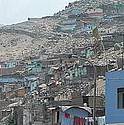
Community Organizations International Gains Safer Streets in Lima
 ACORN members in Lima, Perú often live in constant insecurity in the street and even in their own houses. In an attempt to protect the residents the city has put gates and bars in the streets, creating blockades. This is often counter-productive, however, as then emergency vehicles cannot pass, and at times it hampers victims’ escapes. As well, residents have had to pay for not only the installation of the blockades, but also pay private security guards that are of the same National Police force that should be protecting them. Security in Lima is a matter of money where those that have it can access security and those that do not have to face greater danger due to their lack of resources.
ACORN members in Lima, Perú often live in constant insecurity in the street and even in their own houses. In an attempt to protect the residents the city has put gates and bars in the streets, creating blockades. This is often counter-productive, however, as then emergency vehicles cannot pass, and at times it hampers victims’ escapes. As well, residents have had to pay for not only the installation of the blockades, but also pay private security guards that are of the same National Police force that should be protecting them. Security in Lima is a matter of money where those that have it can access security and those that do not have to face greater danger due to their lack of resources. The members of ACORN initiated a campaign in the communities of San Juan of Lurigancho (Motupe) and Palomino to push the Police to assume the role of public safety servant they are supposed to fulfill and these are some recent achievements:
In Palomino an ACORN held meeting with Major Lujan, who is responsible for the Precinct, gave these results:
• increased police patrols
• better response times to the emergency line, which was slow in the past
• better monitoring in the grade schools and high schools of the area Motupe. Here the problems are greater, as it is a young town with many needs, after an action the members negotiated with Major Malaspina with the following results:
• policing of the Educational Center, due to the fact that thugs attacked youths as they left at the end of the school day
• police patrols that included community members during the nights
• officers working in known areas of drug sales
At a meeting of over 350 people Lima ACORN’s demands were signed by Colonel Aguilar, the chief of security of the national police for the seventh zone, and the Commissioner of Palomino.
In Lima, Perú ACORN continues actions to achieve a true level of security, and to reform laws that support crime and that currently do not permit the police to do their work.
-
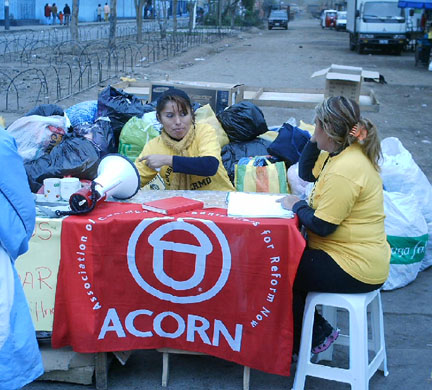
Earthquake damages ACORN Peru
 .A severe earthquake, measuring 7.5 on the Richter scale, struck southern Peru at 6:41 p.m., Wednesday, Aug. 15. Officials are currently reporting almost 500 deaths and more than 1,000 injured as a result.
.A severe earthquake, measuring 7.5 on the Richter scale, struck southern Peru at 6:41 p.m., Wednesday, Aug. 15. Officials are currently reporting almost 500 deaths and more than 1,000 injured as a result. Most of the damage occurred approximately 74 miles from Lima, in the cities of Pisco, Chicha, and Ica, where 70 percent of the buildings were destroyed.
The effects of the earthquake were also felt in Lima – where ACORN Peru has its office – and in the communities where ACORN is organizing chapters. Lima is experiencing power outages and damaged roads and buildings. Health Minister Carlos Vallejos has also declared hospitals in a state of emergency.
The homes in the informal district of San Juan de Lurigancho are the most vulnerable to earthquakes due to their structural instability. ACORN communities in this area have suffered from falling rocks and weakened housing foundations.
ACORN Peru members and staff continue to work through these difficult times and search for the best means to support those affected by this disaster.
Please take time now to make an online donation to help ACORN Peru.
-
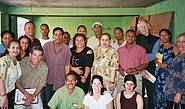
ACORN Dominican Republic
 ACORN Dominican Republic was formed in the wake of tropical storm Noelle, which hit the DR in October of 2007. This birth of ACORN Dominican Republic was also catalyzed in part by the emergency relief efforts in wake of tropical storm Noelle. ACORN DR organized initial recovery efforts, which included mobilizing Dominicans living in the US to donate clothing and other supplies to the victims of the storm.
ACORN Dominican Republic was formed in the wake of tropical storm Noelle, which hit the DR in October of 2007. This birth of ACORN Dominican Republic was also catalyzed in part by the emergency relief efforts in wake of tropical storm Noelle. ACORN DR organized initial recovery efforts, which included mobilizing Dominicans living in the US to donate clothing and other supplies to the victims of the storm.In spite of this rough start ACORN DR has blossomed. Since the strom we have expanded to Los Salados Viejos, Los Salados Nuevos and Vuelta Larga. In just a few months, our membership base has grown to over 700 people from low-income neighborhoods in Santiago de los Caballeros. Thus far we have conducted several successful public health campaigns, collectively removing over 40 tons of trash, winning a bi-weekly trash pick up service from the municipality, and working with the public health ministry to eradicate rats and conduct trainings around important home sanitation issues. Then, during the 2008 presidential elections, we partnered with Participción Cuidadana (a non-partisan civic participation group with whom the American Dominican Council collaborated during the 2004 presidential elections) to monitor voting spots and ensure the transparency of election results.
Our Chapter in the Dominican Republic came out of an initiative of Dominican ACORN members from New York City, whose positive experience of ACORN in the States (and intimate connection with their families and friends in the DR) lead them to explore the possibility of opening up an ACORN branch back home. They formed the ACORN Dominican Council (ADC), which made two trips to the Dominican Republic to meet with community and labor organizations and to the groundwork for ACORN’s future efforts in the country. After several years of exchange—and a successful bi-national campaign to allow Dominicans living abroad to vote from abroad for the first time in 2004.
-
Newsflash 4
ACORN International’s goal is to empower low income people to achieve financial and social justice by working together through direct action, negotiation, legislative advocacy, voter participation, and coalition building.
-
Newsflash 5
ACORN Argentina is improving basic rights in its capital city of Buenos Aires, including the rights to public housing, education, clean air and water by fighting for protection from health hazards caused by traffic pollution and cellular antennas.
-
ACORN India
ACORN India
ACORN India came into existence when in March 2005 the stage was set by the work Community Organizations International was doing in partnership with the FDI Watch campaign in India. ACORN India FDI Watch seeks to scrutinize and challenge Foreign Direct Investment in the retail sector in India. ACORN India seeks to prevent large multi-national companies like Wal-Mart from entering Indian markets unless they guarantee protection of communities they affect; ensure stability of the existing small businesses and ensure livelihoods of small traders; guarantee fair wages, just working conditions and a right to unionize to all their employees; and ensure that a significant portion of the supplies comes from the Indian markets.
Since the economic liberalization in 1991, India has been on a trajectory of accelerated capitalist development with fast growing middle class consumers, which presents multi-national retailers and corporations with tempting opportunities for establishing presence in the Indian markets. India has not allowed, so far, vehemently anti-union, anti-worker corporations to establish their control over the market. But one of the last remnants of the Nehruvian socialist legacy is now in danger from the onslaught of the march of global corporatism. Countries like India are the next frontiers of significant market expansion for multi-national corporations; and these corporations are now starting to apply extreme pressure on the government of India for unfettered access. Indian market is facing an onslaught of both foreign and domestic corporate retailers, the most notable of which is Wal-mart.
Since 2006 we have built key relationships with leadership of political parties, trade unions, hawkers and farmers’ groups, peoples’ movements and the media. Over last two years ACORN India has built a coalition with community organizations, trade unions, peoples’ movements and NGOs, thus engaging progressively in poverty alleviation and urban development.
Through grassroots mobilization, documentation and research, and media advocacy, the India FDI Watch campaign has succeeded in bringing the negative effects of corporate retail expansion to the attention of state, national, and international media—and authorities.
This past year, ACORN India has broadened its focus to include concerns outside of corporate retail. One such concern has been the problems that face waste-pickers living in Delhi and Mumbai, whose lack of recognition from the government leaves them without social protections such as healthcare and education. One of the major constituencies with which ACORN India is establishing work are the waste pickers. It also puts them at the risk of harassment from security forces, civilians, middle men who sell their goods, and private recycling companies.
Waste pickers are workers who scavenge through the city’s garbage to sell it to the recycling industry. ACORN India is in the process of building a membership base amongst these workers so that they can secure protections of their livelihoods and persons. Community Organizations International has 1400 members among waste pickers.
ACORN India is also demanding that the Government of India agree to a Universal Health Plan to include the unorganized workers. We are proposing that our members can be covered by this policy using part of their membership dues as the premium.
With our initial successes in mind, ACORN India is eager to continue to grow its membership and to conduct larger-scale campaigns around all of the important issues that our members face—poverty; discrimination based on caste, gender, and religion; poor provision of services, and lack of government accountability.
-
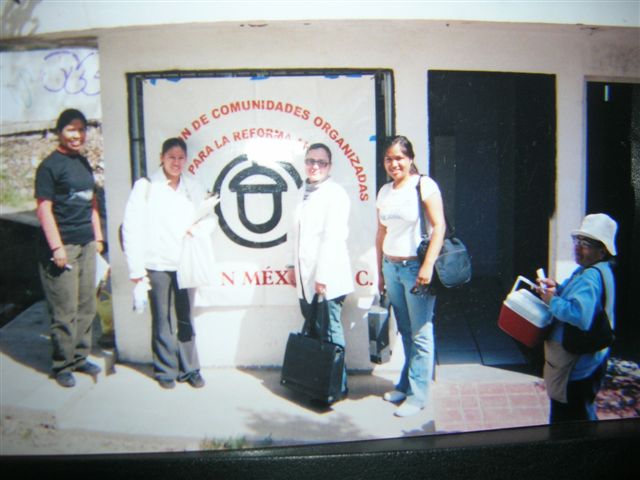
About ACORN Mexico

Our first chapter in Mexico, ACORN Tijuana, was organized at the behest of Mexican ACORN members in San Diego. With their help and encouragement, we launched ACORN Tijuana in 2005, and immediately began working on issues that affected BOTH Mexico and the United States. One of our first campaigns focused on the industrial waste created by Maquiladora factories near the US/Mexico border, which was dumped very close to where our members were housed. Through a collective effort, we secured guarantees from the Maquiladoras to properly treat industrial waste, repair leaks, and dump it in a secure area far from residents’ homes. We also secured green spaces and regular neighborhood cleanups for our members who were living in Maquiladora housing, which was surrounded by concrete and burdened with enormous heaps of accumulated waste.
After three years of organizing in Tijuana, we expanded to Mexico City in January 2008. Thus far, our fledgling office has conducted several small scale campaigns around security issues. Our most important work, however, has been building alliances that will allow us to conduct great campaigns in the future. For example, right now ACORN Mexico City is in the process of negotiating with local doctors at the University of Xochimilco, a highly regarded university with a great community health program. With their help, we are devising a community health worker training program that will serve low-income members by providing care AND engaging in advocacy around healthcare issues. We are developing a similar model for other ACORN International offices as well.
With our initial successes in mind, ACORN Mexico is eager to continue to grow its membership and to conduct larger-scale campaigns around all of the important issues that our members face–problems that can only be combated by a well informed citizenry that is willing and able to collectively demand accountability on the part of the governments that serve the. ACORN Mexico is using the strength of an organized majority to create real improvements in their neighborhoods.
